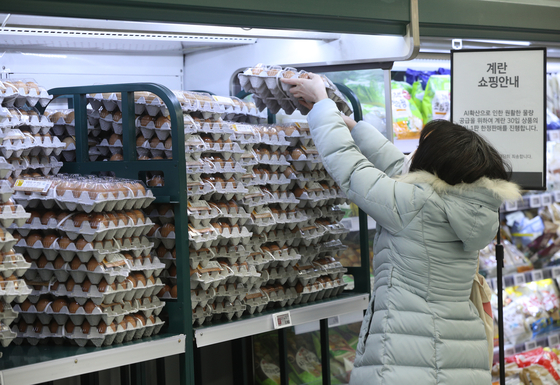
On the 20th, citizens are choosing eggs at a large supermarket in Seoul. According to Livestock Distribution Information from the Livestock Quality Assessment Service, the price of an egg (30 special eggs) was 6,705 won as of the 18th, and has been rising since September 2017 for the first time exceeding 6000 won. News 1
Egg prices are soaring. As the price of a single egg soared over 2,000 to 3,000 won in a month and even became scarce, some marts are limiting sales to one per person. However, hypermarkets are analyzing that this spike in egg prices is only a temporary supply-demand imbalance and will not lead to an’egg wave’ like four years ago.
The price of a single egg (30 special eggs) based on a hypermarket was around 4,000 won last month, but it jumped to 6,000 won this month as the highly pathogenic avian influenza (AI) broke out. On the 20th, a mart in Seoul sold a plate of eggs for 7700 won. Park Soon-ja, a housewife in her 60s living in Songpa-gu, Seoul, said, “I bought a plate of eggs for 6900 won last week, but yesterday it was 7,000 won. I bought one more before it became more expensive.” And shook his head.
Three large supermarkets, including E-Mart, Homeplus, and Lotte Mart, have been limiting the number of eggs purchased at online and offline stores (30 special eggs) since the 15th. E-Mart and Homeplus can only purchase up to one edition per person, and Lotte Mart can only purchase up to three editions. Eggs were sold out at online malls, which are cheaper than offline stores. Housewife Kim Yu-mi (37) said, “The 5,980 won has been sold out since a few days ago,” he said. “It was really golden eggs. Instead of eggs, I made a side dish with quail eggs.”
![On the 20th, a notice restricting the purchase of one egg was installed at a large supermarket in Seoul. [중앙포토]](https://i0.wp.com/pds.joins.com/news/component/htmlphoto_mmdata/202101/20/02b41c45-37af-41fa-b0ca-12416ecf8897.jpg?w=560&ssl=1)
On the 20th, a notice restricting the purchase of one egg was installed at a large supermarket in Seoul. [중앙포토]
The Ministry of Agriculture, Food and Rural Affairs is working hard to stabilize the price of eggs by holding events such as’Let’s go to Korea’s farming discount (agricultural product discount)’ with three marts. Through this event, the Ministry of Agriculture and Food is giving marts a 20% discount on purchases of only three items: eggs, cabbage and radish. The Ministry of Agriculture and Food was initially scheduled to start a discount event with three marts from the 28th of this month, but recently accelerated the discount event to the 15th as egg and vegetable prices have risen significantly due to AI and cold waves. Until the 28th, you can buy a plate of eggs (30 special eggs) at 4,500 won to 5,500 won at the three supermarkets.
An official at one mart said, “Although AI has raised the price of eggs to the 6,000 won range, you can buy cheaply with a 20% discount.” A Lotte Mart official said, “There is a side of limiting the amount of eggs purchased in order to secure the quantity of eggs because we do not know how long the aftermath of AI will go,” he said.
Eggs are a representative item with increased demand due to increased consumption of home food due to prolonged coronavirus infection (corona 19). In the midst of high demand, the price rose further due to AI. There are no restrictions on the amount of cabbage and radish purchased at the three marts, along with eggs and discounted prices. The egg purchase limit is 4 years since the’Egg Wave’ in December 2016. At the time, AI exploded, and egg production plummeted.
However, the industry believes that the current supply and demand trend is not as serious as at the time. A livestock buyer of a mart who requested anonymity said, “4 years ago, during the’egg wave’, AI was so severe that movement restrictions were placed on killing and supply and demand were really difficult.” He added, “Eggs always have a tendency to rise in price ahead of holidays when demand is slow. However, prices often drop after the holidays.”
Reporter Baek Minjeong [email protected]
